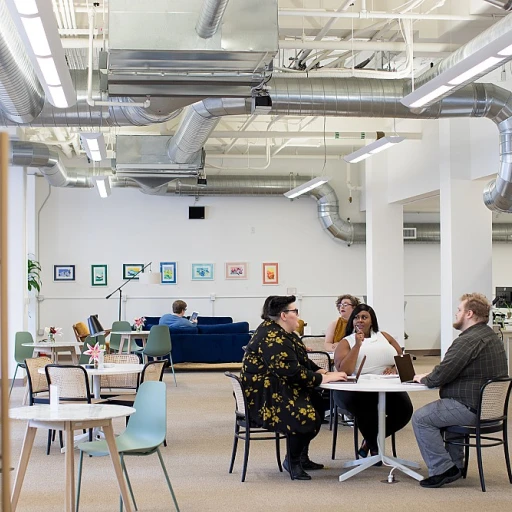Understanding the Role of Group Facilitation in Change Management
The Importance of Guiding Effective Group Dynamics
The foundation of successful change management often hinges on effective group facilitation. Bringing diverse groups together requires a well-orchestrated approach to foster collaboration and innovation. Facilitators step into this dynamic role, ensuring the seamless transition of thoughts into actions. They guide group members, helping them unlock their potential while enhancing the overall work environment through skilled facilitation.
Understanding the nuances of group facilitation is imperative for driving change. Facilitators are crucial in managing meeting structures and group dynamics, ensuring that each voice is heard, and constructive dialogue is fostered. Through their leadership strategies, they steer discussions, manage conflicts, and help build consensus, addressing challenges that may arise during group interactions.
To become an effective facilitator, comprehensive facilitation training is essential. It involves a series of facilitation courses, including hands-on practice sessions, live online modules, and various learning pathways. Whether through online courses or facilitator school, the aim is to refine facilitation skills, allowing facilitators to lead groups more efficiently. Over time, individuals can master skills that enable them to handle group work dynamically, ensuring all members contribute towards common goals.
Time management also plays a crucial role in group facilitation, as sessions need to be productive without overwhelming participants. Through voltage control methods and workshop facilitation techniques, facilitators learn to maintain engagement, keeping the group on track. Learning facilitation techniques not only supports immediate change initiatives but also sets the stage for long-term success in organizational environments.
For organizations, a structured facilitation lab or program could amplify facilitators’ abilities, enhancing their effectiveness in change management. It's about preparing facilitators to navigate the intricacies of group dynamics and emerge as pivotal assets in realizing organizational vision. When done right, facilitation has a profound impact on group cohesion, efficiency, and the ability to adapt to change effectively.
In essence, understanding the art and science behind group facilitation is vital for any organization aiming to maximize its workforce potential through better talent management practices. Learn more about how
maximizing workforce potential through skilled facilitators can drive change effectively within your organization.
Key Skills for Effective Group Facilitation
Developing Essential Facilitation Abilities
Effective group facilitation hinges on acquiring and honing certain vital skills. These skills help facilitators guide their groups through the often complex dynamics of change management.
- Active Listening: This isn’t just hearing what participants say but truly understanding and reflecting back their thoughts. It helps build trust and ensures every group member feels heard.
- Questioning Techniques: A skilled facilitator cultivates the ability to ask open, probing questions. This encourages deeper discussion and draws out insights from quieter members.
- Time Management: Keeping the group on task and ensuring that all topics are covered within the allocated time is crucial. This skill prevents meetings from derailing or exceeding their time limits.
- Conflict Resolution: Managing disagreements in a productive way is part of navigating group work. Facilitators should be prepared to mediate and help the group find common ground.
- Adaptability: The dynamics of a group can change rapidly, and facilitators must be able to pivot their strategies to keep the group effective and engaged.
- Neutrality: A facilitator must remain impartial, creating a safe environment where every participant feels empowered to contribute.
Courses that focus on these facilitation skills are essential for anyone looking to engage in group facilitation successfully. Training programs often include practice sessions and live online modules where participants can work on their skills through real-world scenarios.
Online facilitation offers an avenue for learners to enhance their skills through comprehensive courses available across various platforms. These courses, which can include video and interactive elements, make it possible for facilitators to learn at their own pace.
To truly become an effective facilitator, ongoing learning is required. Facilities such as facilitation labs and facilitator schools offer workshops designed to refine these essential skills over time.
For those interested in deepening their expertise further, exploring training courses that align with the comprehensive principles of
mastering change can be incredibly beneficial. Such exploration would bolster the facilitator’s ability to lead groups through the transformative journey of change management.
Designing a Group Facilitation Training Program
Creating a Structured Learning Environment
Designing a successful group facilitation training program requires a thorough understanding of essential facilitation skills. These capabilities not only enhance the trainer's performance but also foster effective group dynamics. A well-crafted program should incorporate various learning methodologies to accommodate diverse learner preferences.
One of the key components in a training program is integrating blended learning, combining both online and offline methods. Online facilitation courses allow facilitators to learn at their own pace, while live online practice sessions provide interactive experiences through guided meetings with peers and experienced facilitators. This hybrid model ensures that new facilitators can explore different techniques and apply them in real-time.
Another essential factor is the incorporation of hands-on practice. Facilitators can benefit greatly from group work simulations which provide experiential learning opportunities. These workshops offer facilitators the chance to practice essential skills such as voltage control and leadership strategies under realistic conditions, ultimately preparing them to lead diverse groups and workshops efficiently.
Using tools such as video demonstrations, participants can watch seasoned facilitators in action, gaining insights into diverse approaches to managing group dynamics and overcoming challenges. These resources offer them a wealth of knowledge that underscores practical application over theoretical understanding.
Moreover, feedback mechanisms can be invaluable in refining facilitation skills. Encouraging participants to reflect on their learning experiences and program outcomes ensures continuous growth. Collecting feedback from both facilitators and group members allows for adjustments to the training program, enhancing its effectiveness and impact on a change management context.
For further exploration of implementing effective change strategies, consider exploring the
navigating the implementation experience. It highlights the importance of systematic planning and execution within the broader scope of change management, reinforcing the significance of competent group facilitation.
Overcoming Challenges in Group Facilitation
Addressing Common Hurdles in Group Facilitation
Encountering challenges during group facilitation is part of the journey toward becoming an effective facilitator. Facilitators often face obstacles that can hinder the group’s dynamics and the overall effectiveness of the training or workshop. Recognizing and overcoming these hurdles is crucial to the success of any facilitation course.
Managing Time Constraints
One of the most frequent challenges in group facilitation is time management. Facilitators must balance the agenda while allowing sufficient time for discussions and activities. Effective facilitators should:
- Prioritize key learning objectives to ensure critical skills are covered.
- Remain flexible to adapt the agenda as needed to maintain group engagement.
Utilizing time management techniques can help facilitators keep sessions on track while ensuring that group members feel their contributions are valued.
Engaging Diverse Group Members
Facilitators need to be adept at engaging a diverse group of participants with varying backgrounds and experience levels. Strategies to overcome this include:
- Using interactive learning methods such as video, role-playing, and live online practice sessions to cater to different learning styles.
- Encouraging participation by creating an inclusive environment where all group members feel comfortable sharing their views.
Fostering an atmosphere of openness and respect will aid in maximizing the collective potential of the group.
Navigating Group Dynamics
Group dynamics can often pose a challenge in facilitation training. Power struggles or dominant personalities might overshadow quieter members. Some tips to navigate these dynamics are:
- Establish clear ground rules to ensure respectful and productive group work.
- Use leadership strategies to empower quieter members to contribute while managing more vocal individuals.
Regularly revisiting these rules can help minimize disruptions and maintain a positive group atmosphere.
Addressing these common challenges effectively will enhance the overall success of group facilitation training courses, helping facilitators improve their facilitation skills and confidently lead group meetings, workshops, or any facilitation lab setting.
Measuring the Impact of Group Facilitation Training
Evaluating the Success of Facilitation Training Initiatives
Measuring the impact of group facilitation training is vital, not only to ensure resources are well-utilized but also to refine and improve the training program over time. Effective evaluation methods focus on assessing both immediate outcomes and long-term benefits.
- Pre- and Post-Training Assessments: Collecting data on group facilitation skills before and after training helps to identify specific areas of improvement. Course administrators can utilize surveys or observational methods to gather this information. By conducting these assessments, facilitators and participants can see tangible improvements in their facilitation skills and effectiveness in group settings.
- Feedback from Participants: Facilitators should prioritize gathering feedback from group members who participated in the training course. This feedback provides invaluable insights into the training's effectiveness and areas that require adjustment. Creating a culture where participants feel comfortable offering constructive criticism and praise will enhance the training course's credibility and authority.
- Real-Life Application and Observation: In many cases, the ultimate test of a training program comes from real-world applications. Monitoring how teams perform in meetings, workshops, or other group work environments can highlight the practical benefits of facilitation training. Observations should focus on whether there is a noticeable improvement in leading groups, collaboration, and overall meeting efficiency.
- Longitudinal Analysis: To evaluate sustained impacts over time, training facilitators might conduct longitudinal studies. Such analysis can identify whether benefits from facilitation training persist, diminish, or grow as group members continue practicing the skills they’ve learned. By collecting data periodically, the facilitators can track the progression and apply learnings to future facilitation lab sessions.
- Utilization of Technology: Leverage online platforms for feedback and measurement. Many training courses now offer features for video analysis and online facilitation practice sessions. These tools can facilitate tracking improvement over time.
By focusing on these key evaluation strategies, organizations can ensure that their group facilitation training programs are truly yielding the desired outcomes, enabling effective facilitator growth and enhanced group dynamics in the long run.
Real-World Applications of Group Facilitation in Change Management
Real-Life Applications of Group Facilitation in Change Management
Navigating through real-world group work scenarios often demands a proficiently skilled facilitator. Effective facilitators harness their skills to lead groups toward embracing change, overcoming resistance, and fostering collaboration among group members.
A substantial benefit of facilitation courses and online resources is their ability to prepare facilitators for diverse environments. By embracing both in-person and live online methods, these training programs equip facilitators to conduct workshops that champion inclusive dialogue and actionable solutions.
Organizations implementing change initiatives can utilize facilitation labs or facilitator schools to refine their team dynamics. Trainings that focus on developing facilitation skills are crucial in enabling teams to collaboratively tackle challenges inherent in the change process.
Effective facilitators apply skills acquired from facilitation training courses to cultivate environments where group members feel heard and valued. They are adept at steering meetings that harness the collective energy and potential within teams using well-structured leadership strategies.
Through well-designed practice sessions within a facilitation course, facilitators can hone their craft in real-world situations. This continuous learning not only enhances personal growth but also enriches group dynamics by ensuring every voice contributes to the conversation.
Facilitation, therefore, is a powerful strategy that, when applied in the context of change management, leads to more cohesive teams and successful outcomes.














